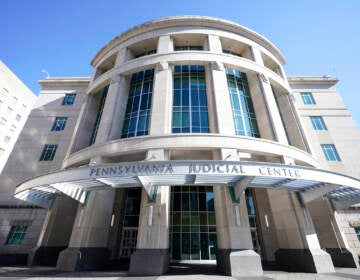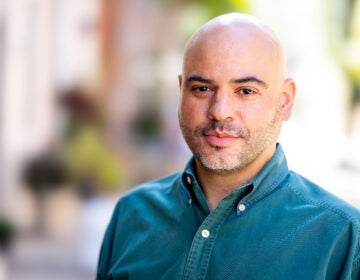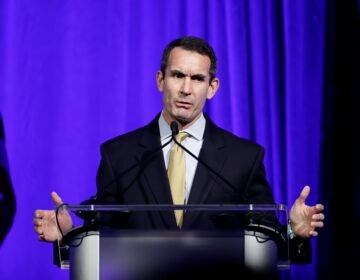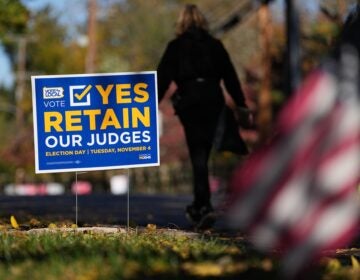2 years after Roe reversal, Penn and Temple students hope to mobilize young voters over abortion rights
The youth vote made a difference in the 2020 presidential election, and Democrats hope that issues like reproductive rights will bring them out again.
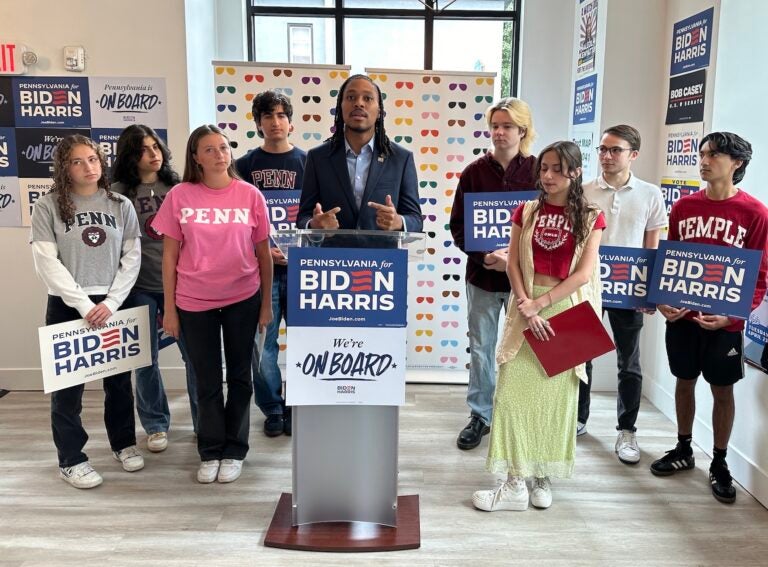
University of Pennsylvania and Temple University students join State Representative Malcolm Kenyatta at the Biden-Harris campaign’s north Philly headquarters to discuss the role of reproductive health rights in the 2024 election. (Carmen Russell-Sluchansky/WHYY)
What questions do you have about the 2024 elections? What major issues do you want candidates to address? Let us know.
University of Pennsylvania and Temple University students joined state Representative Malcolm Kenyatta and Biden campaign officials to speak out for reproductive health rights and encourage young voters to go to the polls in November.
“Two years ago, when news leaked in the Supreme Court was going to overturn Roe, I remember feeling sick to my stomach at the thought that I was entering adulthood with fewer rights than my mother and grandmother,” said Nica Smith, a University of Pennsylvania sophomore who serves as Vice President of Penn’s Student Democrats organization. “I remember feeling afraid at what this would mean for my future.”
Smith said the decision in November was clear, expressing concern that Donald Trump would expand anti-abortion efforts if he were elected again.
Trump is credited — including by himself — with the overturning of Roe v. Wade, the 1973 Supreme Court decision that guaranteed the right to abortion for nearly 50 years. Before then, Trump’s views on the subject were capricious — before his race for president, he once announced, “I am pro-choice in every respect.”
However, during his first term, he appointed Justices Amy Coney Barrett, Brett Kavanaugh and Neil Gorsuch to the Supreme Court, pushing it further to the right on the abortion question. In 2022, the new court, in the Dobbs v. Jackson Women’s Health Organization case, effectively killed the national right to choose, leaving it up to individual states to determine the legality. Now, 14 states ban the procedure, with several other states placing greater restrictions than Roe v. Wade has allowed, such as a shorter gestational period when it’s allowed.
Trump now claims that he is not interested in instituting a national ban as some fear he would if given a second term.
“My view is now that we have abortion where everybody wanted it from a legal standpoint, the states will determine by vote or legislation or perhaps both,” Trump said in a video posted to Truth Social.
Pennsylvania State Representative Malcolm Kenyatta, who is also the Democratic nominee for state Auditor General, says he doesn’t “trust” Trump’s claim, but also that “we cannot have a patchwork approach to abortion against access.”
“We can’t have it be that if you live in Ohio, you can look across and see Pennsylvania, and you have a different approach to a basic fundamental health care decision,” he told WHYY News.
Kenyatta also pointed out that, in 2022, Republicans in Harrisburg pushed a constitutional amendment through a late-night legislative proposal, which would have provided a path for anti-abortion activists to restrict abortion in the commonwealth. The attempt failed, but Republicans currently control the state Senate, while Democrats currently hold a two-seat majority in the House of Representatives. Democrats fear that if Republicans gain control of the legislature in November or the state supreme court, they could try again to get Pennsylvania closer to its own abortion ban.
“We were one vote away from being in a much different circumstance,” he said. “And here in Pennsylvania, for example, our constitutional amendments can’t be vetoed by the governor.”
Smith added that depriving some people of rights that others have isn’t justice.
“I think anything other than a national right to choose is unfair and unequal,” she said.
Turnout among young voters has been historically low compared to other age groups. That changed in 2016 when more young voters showed up to the polls on both sides of the aisle. The 2020 election saw an even larger increase in the youth vote, with 54% of those between 18 and 29 in Pennsylvania — and 48% of those 18 and 19 years old — casting their ballots.
This year, concerns over Biden’s age and his handling of Gaza are in conflict with support from young voters for his efforts on student loan forgiveness and his stand on issues such as climate change and, of course, abortion.
“In recent years, we’re all getting really fired up, and we have a lot to say, and I’m feeling hopeful that we will show up to the polls and that we won’t end up in a future where there is a national abortion ban,” Lourdes Cardamone, a sophomore at Temple University told WHYY News. “So I’m feeling confident that young people are going to show up.”

Get daily updates from WHYY News!
WHYY is your source for fact-based, in-depth journalism and information. As a nonprofit organization, we rely on financial support from readers like you. Please give today.



